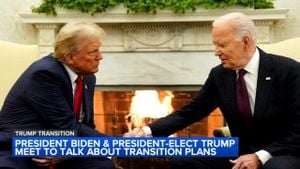Whoopi Goldberg, the iconic comedian and Oscar-winning actress, recently found herself at the center of controversy after sharing her perspective on financial struggles during a segment of The View. The 69-year-old entertainer opened up about her current financial situation, likening her challenges to those faced by millions of working-class Americans. This discussion, which included poignant remarks on the realities of financial hardship, unexpectedly led to public backlash, raising eyebrows and prompting ridicule online.
During the episode aired on November 12, Goldberg articulated her predicament, stating, “I appreciate people are having a hard time; me too — I work for a living. If I had all the money in the world, I would not be here, okay? So, I’m just saying.” She added, “My kid has to feed her family. My great-granddaughter has to be fed by her family. I know it’s hard out there.” Her admission aimed to resonate with her audience, many of whom are grappling with economic difficulties.
Yet, the response on social media was swift and often scathing. Critics quickly pointed out the stark disparity between Goldberg's financial situation and the struggles of the average American worker. With an estimated net worth of around $30 million, along with significant annual earnings reportedly between $5 million and $8 million from her role on The View, many dubbed her sentiments as out of touch. Commentators across various platforms quipped about her claims of struggling, with some sarcastically remarking, “Yeahhhhhh, nooooooooo Whoopi just no. Let me go get the world’s tiniest violin for her.”
Goldberg's financial scenario may seem incongruous when juxtaposed with her statements. She owns multiple properties, including homes valued at millions located across New Jersey, Connecticut, New York City, and even abroad. Many argued this opulence stands at odds with her claims of needing to work for financial stability. Responses ranged from disbelief to outright ridicule as netizens expressed their sentiments about celebrity culture being disconnected from the realities most face.
Supporters of Goldberg were equally vocal, defending her right to speak about her difficulties and asserting, “Just because someone is rich doesn’t mean they don’t have financial problems.” This viewpoint highlights the complexity often involved with personal finances, even within the wealthiest individuals who may still face substantial costs, including mortgages and family obligations. Critics, though, remained unconvinced, stressing the disconnect displayed by someone of her status speaking on such issues.
Goldberg’s comments are reminiscent of the sentiments previously expressed by other celebrities, whereby their financial narratives fail to resonate with the average American experience. A notable recent example includes Sydney Sweeney from Euphoria, who has candidly discussed her financial struggle with the modern acting payment structure—the lack of residuals and ever-present management fees often erodes her earnings. This juxtaposition of perceived wealth and actual financial strain continues to echo through Hollywood.
Analyzing Goldberg’s past, it’s important to note her rise to fame. She came from humble beginnings, born Caryn Elaine Johnson in New York City’s Chelsea Housing Projects. After dropping out of high school, she endeavored through numerous jobs, from waitress to bricklayer, before tasting success on stage with her groundbreaking one-woman shows, which led to the heights of Broadway and eventually to iconic film roles. This narrative of struggle only amplifies the bewilderment surrounding her latest remarks on financial health.
Even with her illustrious career, characterized by her EGOT status (Emmy, Grammy, Oscar, and Tony awards), the question remains: how does someone with such achievements find themselves expressing empathy for working-class Americans? The general consensus on social media seems to crystallize around the idea of mutual respect; many Americans simply do not perceive her as someone who should be lamenting financial woes.
While addressing broader economic topics, Goldberg's statements reflect on how the entertainment industry often fails to bridge the gap between its luminaries and the public. With the income gap becoming increasingly pronounced post-pandemic, conversations about wealth, earnings, and perspectives on economic mobility have become more prevalent. Goldberg's case resonates within this broader narrative, inviting scrutiny more than sympathy.
It’s evident from her statements and the ensuing debates on social media platforms such as TikTok and Twitter, where users vehemently argue the merits of her claims. Real estate professionals, everyday citizens, and even younger generations expressed their dismay at what they perceived as insensitivity to the struggles of those hardly making ends meet. Some pointedly remarked how her weekly earnings surpassed what many people earned annually.
The backlash surrounding Goldberg's comments isn’t just about her financial standing; it encapsulates the broader dialogue about privilege and perspective. Many have called for greater awareness and sensitivity from public figures who wield influence and societal power. Celebrities, who often lead seemingly charmed lives, have faced increased scrutiny as fans demand authenticity and relatability.
Goldberg’s situation raises significant questions about the balance between personal experience and public perception. How do public figures navigate their success without appearing insensitive? This incident serves as a case study of the complex dynamics within celebrity culture and its interaction with the public’s reality, showcasing the necessity for empathy cut with the harsh truth of modern wealth.
Overall, whether Goldberg genuinely identifies with the economic struggles faced by average Americans remains to be seen, but the reception of her remarks highlights the importance of being mindful of the realities many face. Her celebrity status, wealth, and successive career may shield her, but they also put her under intense scrutiny, reaffirming the fine line public figures must walk when speaking on such relevant issues.



